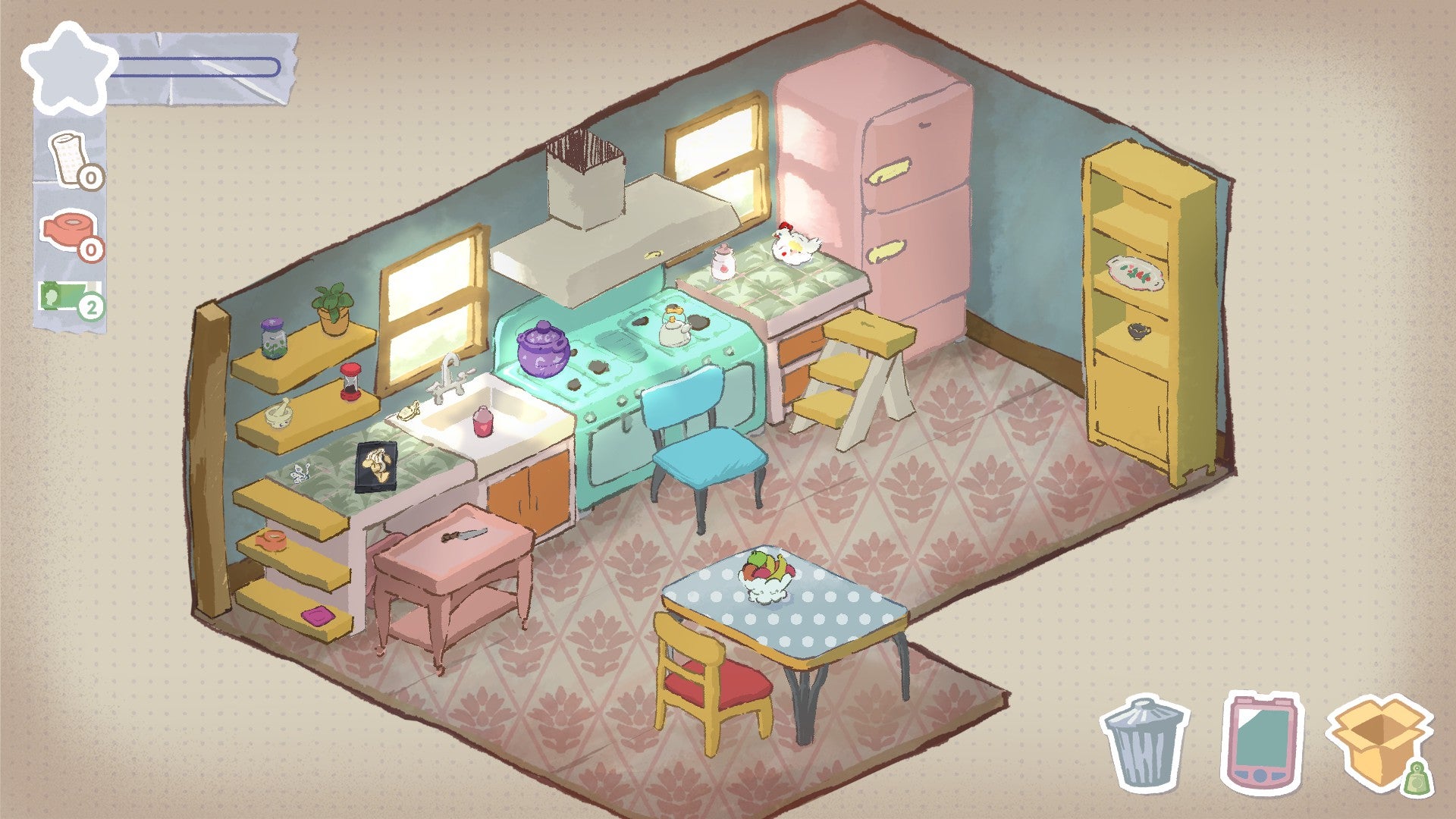Even unintentionally, sorting puzzler A Storied Life: Tabitha risks gamifying grief

I should say, up front, that I believe A Storied Life: Tabitha means well. Although it joins a swelling collection of cosy/'wholesome' games that also happen to be about death, it’s more grounded than most, forgoing grand scenery and grander metaphors to simply have you clearing out a deceased loved one’s house while patching up her unfinished memoirs. All perfectly earnest and untoward, it would seem, and yet I walked away from my Gamescom demo last month feeling uneasy – especially about how its puzzle aspect undermines, rather than enables, its posthumous storytelling.
And it’s not like I didn’t get the setup. Half of A Storied Life plays out like Unpacking in reverse: you get an isometric view of one of Tabitha’s rooms, and must rifle through its nooks and crannies to find left-behind items that you can save, sell, or throw away. You can only keep as many mementos as your sole carboard box will allow, bigger stuff taking up more of its inventory-style grid, and there’s some light sub-puzzling as you decide which of the more fragile items are most deserving of your limited bubble wrap supplies.
I know this chuck-or-save dilemma well, because navigating it has occupied a good chunk of the past year: my dad’s passing in 2024, following my mum’s in 2020, left my siblings and I in charge of auditing and sorting every last trinket in our now-empty family home. Unless some debased soul has made a Steam Deck benchmarking simulator, A Storied Life might be the one game in existence that most closely speaks to my recently lived experience. Packing tape shortages and all.
Image credit: Secret ModeThis specific part, the game does rather well. Besides the simple (and also Unpacking-like) tactile pleasures of dragging aside a chair to reveal a valuable find, the restrictions on how much you can preserve do effectively recreate that need to make judgement calls – however uncomfortable – on what’s really worth taking with you. As well as the twinge of guilt that comes with dropping handfuls of old possessions into a bin bag, eased only by the relative certainty that if their owner was still here, they’d be saying something to the effect of "Well, what are you going to do with twelve Ronan Keating CDs?"
Get into the other half, though – the memoir writing – and that air of empathy starts getting thick with the scent of conventional gameyness. To fill in the blanks of Tabitha’s patchy tome, you’re given a narrow selection of words based on the items you kept from the previous room: some of them general nouns and adjectives that could potentially work in multiple gaps, others pertaining to a specific time, place, or feeling.
The idea is that rescued memories from Tabitha’s physical space become the story of her life in written form, and you’re encouraged to take good care of the fragile stuff by broken items mostly contributing sad, even bitter words that would quickly bring the memoir’s mood down. It seems difficult, if not impossible to keep (and avoid breaking) enough objects to fill every single page with positivity, but replaying is encouraged, as choosing different items can drastically change Tabitha’s story, from where she worked to her relationships with her kids.
Image credit: Secret ModeThat would, in turn, suggest that there aren’t really 'right' and 'wrong' combinations. Except, there are, as it’s absolutely possible to end up with a word menu that turns the memoir into either a series of suddenly depressing non sequiturs or, worse, utter nonsense. Just a couple of rooms in, a single snapped spoon meant that to ensure all the gaps were filled, I’d need to character-assassinate Tabitha’s previously beloved husband, my supply of upbeat descriptors having been quickly exhausted. The room after, I’d boxed up multiple mementos and yet had so few nouns to work with that I had no choice but to say her children were all born "at church." Nobody’s given birth in a church since 1747, surely.
Besides the fact that being railroaded into weird responses undermines the idea that you’re completing the tale of a cherished relative, it also clashes with the otherwise well-executed house clearance aspect. Instead of saving bits and pieces for sentiment’s sake, the memoir-writing system encourages you to essentially shop around for what might bag you the 'best' words. Simultaneously, it discourages you from picking up fragile items that might have been meaningful keepsakes, on the grounds that they could break in transit and poison the well with grim adverbs.
There isn’t a canon story of Tabitha that needs to be told as accurately as possible, but the freeform, tell-it-your-way concept doesn’t shine through either – in my demo, it still felt like I’d done something objectively incorrect whenever progression demanded I scribble in text I didn’t want to. And not just because I wanted to maintain a happy vibe, but because it just didn’t feel right to put words in Tabitha’s mouth that I had no confidence she’d say herself.
It's ironic: a game I could so closely relate to, strong-arming me by its structure into doing things I’d never do. When I wrote my dad’s eulogy – granted, not an autobiographical work – I took care to make it a speculation-free fact fest, and I can’t even bring myself to continue working on my mum’s family tree project – for years, her primary pastime – because I fear my relative lack of anthropology nous would sully it with an error.
Image credit: Secret ModeA Storied Life astutely observes that bereavement often comes with responsibilities, many of which are mundane and administrative, and I appreciate how it (initially) captures the dissonance between pain and pragmaticism that feels unique to the process of settling someone else’s affairs. Again, I don’t think it would knowingly aim to dilute that feeling, especially after speaking to some of the Lab42 developers at Gamescom and confirming that the whole concept was inspired by their own experiences with familial loss.
Maybe the game’s later stages could, therefore, express and examine grief without so much of the Good Choice/Bad Choice puzzling; ultimately I only cleared three rooms of what looks like an enviably spacious house. But for me, another responsibility we have to the dead is to tell their story as we know it, resisting the temptation to fill in the gaps with guesswork. If the only option is to plough ahead with fabrications, I’d rather not do it at all.
Check out our Gamescom 2025 event hub for all the PC game announcements and preview coverage from Cologne.













